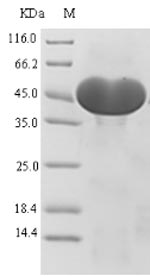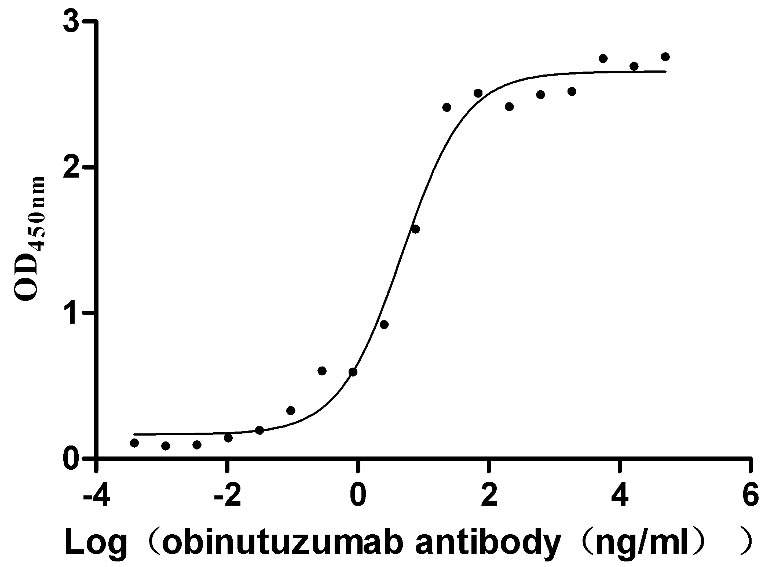Recombinant Human ATP-citRate synthase (ACLY), partial
In Stock-
货号:CSB-EP001158HU
-
规格:¥1836
-
图片:
-
其他:
产品详情
-
纯度:Greater than 90% as determined by SDS-PAGE.
-
基因名:ACLY
-
Uniprot No.:
-
别名:ACL; Acly; ACLY_HUMAN; ATP citrate (pro-S) lyase; ATP citrate lyase; ATP citrate synthase; ATP-citrate (pro-S-)-lyase; ATP-citrate synthase; ATPcitrate synthase; ATPCL; Citrate cleavage enzyme; CLATP; OTTHUMP00000164773
-
种属:Homo sapiens (Human)
-
蛋白长度:Partial
-
来源:E.coli
-
分子量:45.5kDa
-
表达区域:4-265aa
-
氨基酸序列KAISEQTGKELLYKFICTTSAIQNRFKYARVTPDTDWARLLQDHPWLLSQNLVVKPDQLIKRRGKLGLVGVNLTLDGVKSWLKPRLGQEATVGKATGFLKNFLIEPFVPHSQAEEFYVCIYATREGDYVLFHHEGGVDVGDVDAKAQKLLVGVDEKLNPEDIKKHLLVHAPEDKKEILASFISGLFNFYEDLYFTYLEINPLVVTKDGVYVLDLAAKVDATADYICKVKWGDIEFPPPFGREAYPEEAYIADLDAKSGASLK
Note: The complete sequence including tag sequence, target protein sequence and linker sequence could be provided upon request. -
蛋白标签:N-terminal 6xHis-SUMO-tagged
-
产品提供形式:Liquid or Lyophilized powder
Note: We will preferentially ship the format that we have in stock, however, if you have any special requirement for the format, please remark your requirement when placing the order, we will prepare according to your demand. -
缓冲液:Tris-based buffer,50% glycerol
-
储存条件:Store at -20°C/-80°C upon receipt, aliquoting is necessary for mutiple use. Avoid repeated freeze-thaw cycles.
-
保质期:The shelf life is related to many factors, storage state, buffer ingredients, storage temperature and the stability of the protein itself.
Generally, the shelf life of liquid form is 6 months at -20°C/-80°C. The shelf life of lyophilized form is 12 months at -20°C/-80°C. -
货期:3-7 business days
-
注意事项:Repeated freezing and thawing is not recommended. Store working aliquots at 4°C for up to one week.
-
Datasheet & COA:Please contact us to get it.
相关产品
靶点详情
-
功能:Catalyzes the cleavage of citrate into oxaloacetate and acetyl-CoA, the latter serving as common substrate for de novo cholesterol and fatty acid synthesis.
-
基因功能参考文献:
- SLC25A1 and ACLY upregulation suggests that metabolic reprogramming in Behcet's syndrome involves the citrate pathway dysregulation. PMID: 30050389
- ACL regulates the net amount of acetyl groups available, leading to alterations in acetylation of H3(K9/14) and H3(K27) at the MYOD locus, thus increasing MYOD expression. PMID: 29241530
- Results show that ACLY was up-regulated in human gastric cancer (GC) tissues and cell lines and a critical downstream target of the tumor suppressor activity of miR-133b in GC. PMID: 28901466
- ACLY and ACSS2 are both activated to produce cytosolic Ac-CoA from glucose carbon for lipogenesis during human cytomegalovirus infection. PMID: 28167750
- ACLY facilitates histone acetylation at double-strand break (DSB) sites, impairing 53BP1 localization and enabling BRCA1 recruitment and DNA repair by homologous recombination. ACLY phosphorylation and nuclear localization are necessary for its role in promoting BRCA1 recruitment. PMID: 28689661
- The protein crystallized consisted of residues 2-425-ENLYFQ and S-488-810 of human ATP-citrate lyase. (2S,3S)-2-Hydroxycitrate binds in the same orientation as citrate, but the citrate-binding domain (residues 248-421) adopts a different orientation with respect to the rest of the protein (residues 4-247, 490-746 and 748-809) from that previously seen. PMID: 28777081
- CUL3 interacts with ACLY through its adaptor protein, KLHL25 (Kelch-like family member 25), to ubiquitinate and degrade ACLY in cells PMID: 27664236
- we found that depletion of ATP citrate lyase suppressed tumor growth, which suggests that ATP citrate lyase-related inhibitors might be potential therapeutic approaches for breast cancer. PMID: 28443474
- Results show that ACLY is a key phosphoprotein effector of IL-2-mediated T-cell responses. ACLY becomes phosphorylated on serine 455 in T lymphocytes upon IL-2-driven activation of AKT, and depletion or inactivation of ACLY compromises IL-2-promoted T-cell growth. PMID: 27067055
- ACLY was also required for LMW-E-mediated transformation, migration, and invasion of breast cancer cells in vitro along with tumor growth in vivo In clinical specimens of breast cancer, the absence of LMW-E and low expression of adipophilin (PLIN2), a marker of lipid droplet formation, associated with favorable prognosis PMID: 26928812
- ACL activity is associated with increased ATP. Activation of this IGF1/ACL/cardiolipin pathway combines anabolic signaling with induction of mechanisms needed to provide required ATP. PMID: 26039450
- These results suggest that the combined expression of GLUT1 and ACLY could be a more valuable prognostic factor than their individual expression in node-negative patients with NSCLC. PMID: 25837797
- Polymorphisms of ATP citrate lyase gene is associated with recurrence in colorectal cancer. PMID: 25890184
- SNP rs9912300 in ACLY gene was significantly associated with response to therapy in hepatocellular carcinoma PMID: 25735330
- The activation of AMPK under ACLY knockdown conditions may lead to p53 activation, ultimately leading to cellular senescence. PMID: 25367309
- ATP citrate lyase mediates resistance of colorectal cancer cells to SN38. PMID: 24132143
- These data indicate that inhibition of ACLY might affect both fatty acid elongation in ER and FAO in mitochondria, thereby explaining the TG accumulation with altered fatty acid composition. PMID: 24310723
- ACLY inhibition exerts an anticancer effect via increased reactive oxygen species, and p-AMPK could be a predictive biomarker for its therapeutic outcome. PMID: 23506848
- ATP citrate lyase functions in cancer stem cells to regulate stemness. PMID: 23807225
- ATP citrate lyase is important for the pyruvate citrate shuttle and lipid synthesis in insulin secretion. PMID: 23225248
- ACLY mRNA and protein levels markedly and quickly increase in activated macrophages. Importantly, ACLY activity inhibition as well as ACLY gene silencing lead to reduced nitric oxide, reactive oxygen species and prostaglandin E2 inflammatory mediators. PMID: 24051091
- ACLY silencing clearly induces proliferation arrest and apoptosis in variety of cancer cell lines by affecting multiple downstream pathways. PMID: 22718913
- The present review highlights current knowledge about the role of ACLY in cancer cells. PMID: 22787121
- Chemical modification, steady-state and pre-steady-state kinetics, and rapid kinetics collectively demonstrate the essential role of the active site His760 in the ACL reaction: His760 acts as a phosphate acceptor to initiate the biosynthetic reaction. PMID: 22657152
- Suggest that ATP citrate lyase may contribute to the pathogenesis of human epithelial ovarian cancer, and may serve as a novel therapeutic target. PMID: 22266777
- crystals of ATP-citrate lyase diffracted to 2.3 A resolution PMID: 22102020
- Differences between human and rodent pancreatic islets: low pyruvate carboxylase, atp citrate lyase, and pyruvate carboxylation and high glucose-stimulated acetoacetate in human pancreatic islets. PMID: 21454710
- Data suggest that ATP-citrate lyase (ACLY) expression and activity can be suppressed by exogenous lipids and demonstrate a critical role for ACLY in pancreatic beta cell survival. PMID: 20693577
- Data show that siRNA-mediated silencing of SREBP-1 and ATP citrate lyase significantly attenuated H(2)O(2)-induced senescence PMID: 20615871
- Identification of the citrate-binding site of human ATP-citrate lyase using X-ray crystallography. PMID: 20558738
- ACLY is a positive regulator of glycolysis in glioblastoma cells. PMID: 19795461
- data presented indicate that the ATP citrate lyase pathway is operative in human platelets and may be responsible for increased acetyl-CoA in diabetic platelets which may be the cause of their excessive activity in the course of the disease PMID: 14681844
- Atp citrate lyase is involved in lung cancer pathogenesis associated with metabolic abnormality and might offer a novel therapeutic target. PMID: 18922930
- The activities of ATP citrate lyase were decreased by 57% in pancreatic islets of patients with type 2 diabetes. PMID: 19296078
- findings suggest that ATP-citrate lyase activity is required to link growth factor-induced increases in nutrient metabolism to the regulation of histone acetylation and gene expression PMID: 19461003
显示更多
收起更多
-
亚细胞定位:Cytoplasm, cytosol.
-
蛋白家族:Succinate/malate CoA ligase beta subunit family; Succinate/malate CoA ligase alpha subunit family
-
数据库链接:
HGNC: 115
OMIM: 108728
KEGG: hsa:47
STRING: 9606.ENSP00000253792
UniGene: Hs.387567
Most popular with customers
-
Recombinant Human B-lymphocyte antigen CD20 (MS4A1)-VLPs (Active)
Express system: Mammalian cell
Species: Homo sapiens (Human)
-
Recombinant Human Cadherin-1(CDH1),partial (Active)
Express system: Mammalian cell
Species: Homo sapiens (Human)















